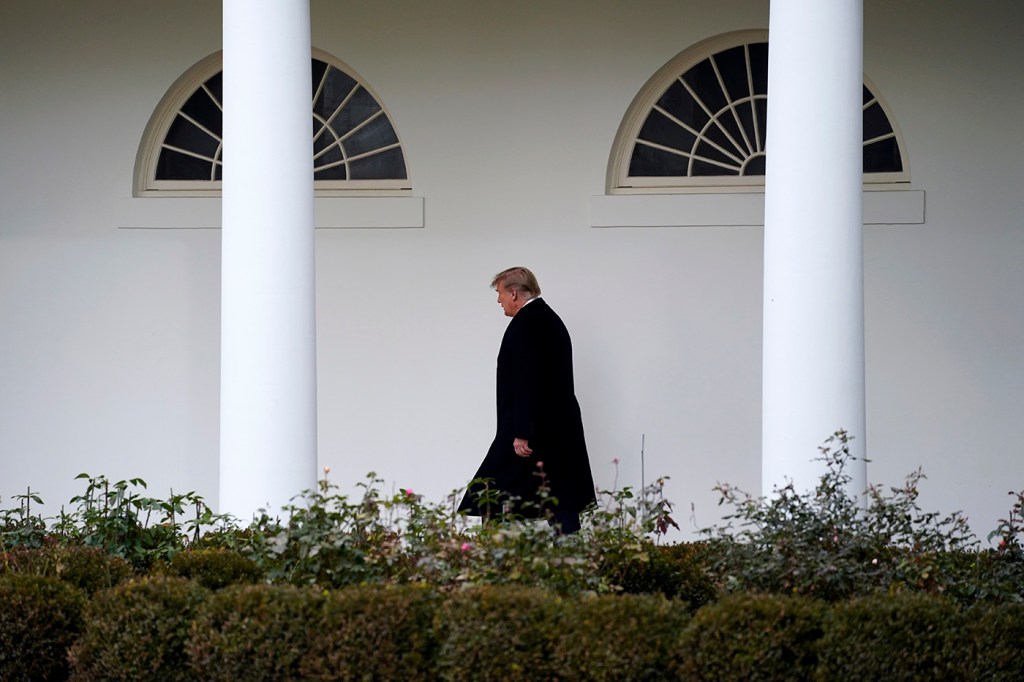That Trump phone call to Georgia was an abuse of office, but probably not criminal

President Donald Trump’s attempt to get a Georgia election official to “find” votes for him was a clear abuse of office, but it would prove difficult for federal prosecutors to show his actions were criminal, according to a pair of Northeastern professors.
In a phone conversation last weekend with Georgia Secretary of State Brad Raffensperger, Trump called on the fellow Republican to “find 11,780 votes, which is one more than we have, because we won the state,” according to a transcript of audio obtained by The Washington Post.
Raffensperger was heard politely but firmly rejecting the president’s overtures and standing by the election results. He also insisted that Trump had been given false information about voter fraud.
The president later tweeted criticism of Raffensperger, saying: “He has no clue.”

Dan Urman (l), who teaches constitutional law and the modern U.S. Supreme Court at Northeastern. Jeremy Paul (r), is the former dean of Northeastern’s law school and now teaches constitutional law, property, and jurisprudence. Photos by Matthew Modoono/Northeastern University file photo
The strong-arm maneuver is a sign of someone who doesn’t accept losing and blames a rigged system, says Dan Urman, who teaches constitutional law and the modern U.S. Supreme Court at Northeastern.
The latest vote-scavenging incident in Georgia “is on-brand behavior,” Urman says, noting the way Trump attacked the Emmy Awards in the past when his reality show “The Apprentice” didn’t win.
It also amounts to an impeachable act, in the same vein as Trump’s efforts to enlist Ukraine to investigate political rival Joe Biden, argues Jeremy Paul, the former dean of Northeastern’s law school, who now teaches constitutional law, property, and jurisprudence.
“It’s more closely connected to an impeachable offense than it would be to a legal violation because high crimes and misdemeanors are not necessarily defined,” Paul explains. “I would call this abuse of office.”
Trump was impeached by the House of Representatives in the Ukraine matter but acquitted in the Senate.
Whether Trump’s actions in Georgia actually rise to a criminal matter however, is doubtful, Paul says. A prosecutor would have to identify instances when Trump had openly admitted that he knew one of the voter fraud charges he had made was not true.
“That’s what I would look for,” Paul says.
Of the states he lost in November, Georgia is particularly vexing to Trump because it was once reliably Republican, Paul says, and because Trump threw his support behind fellow Republican Brian Kemp’s ultimately successful gubernatorial run in 2019.
Since then, Biden became the first Democratic presidential candidate to win the state since Bill Clinton in 1992, edging out Trump by fewer than 13,000 votes. Trump had carried the state four years prior by more than 200,000 votes. Trump has called on Kemp to resign for not supporting his rigged election claims.
“My sense is that the president is sufficiently wrapped up in his own drama that he actually believes that he won the state of Georgia,” says Paul.
The results of the 2020 race gave Biden more than enough Electoral College votes to become president. Those votes are expected to be certified by Congress on Wednesday, despite efforts by some of Trump’s allies on Capitol Hill to question the results in several states, including Georgia.
Adding to the political drama in the state are a pair of Senate runoff races that have kept the political world on edge for months. Winning just one of the two would allow the GOP to retain control of the upper chamber and hold significant sway over Biden’s legislative agenda and personnel appointments.
If the Democrats scoop up both Georgia contests, it would knot the 100-seat chamber at 50 seats apiece and Vice President-elect Kamala Harris would cast the tie-breaker.
It remains to be seen how Trump’s phone call will influence the outcome of those Senate races, Urman says.
“We are at a point of asking how many people are really going to change their views of him, and I would say the number is small,” he points out. “There’s almost nothing Trump can do that makes people say, ‘I was with him until that phone call.’”
Then again, Urman says, some Trump supporters may have had enough and may just walk away. “For them it’s the last straw, although there have been a lot of straws,” Urman adds.
For media inquiries, please contact media@northeastern.edu.





